Best vocal plugins: Our pick of vocal processing software to make your voice shine
If you want that Auto-Tune effect, or need to make a bad vocal great, then these vocal processing plugins will help turn bad singing into perfect vocals, whatever music you make

Want all the hottest music and gear news, reviews, deals, features and more, direct to your inbox? Sign up here.
You are now subscribed
Your newsletter sign-up was successful
If singing is important to your songs and recordings then there are plenty of software plugins available to assist your recording and editing endeavours. The best vocal plugins are many and varied and can be used to help make great vocal recordings, or turn bad takes into recordings that can be used in any mix.
Vocal processing plugins include general mix plugins for adding EQ solidity and sparkle to male or female vocals, or classic, colourful compression for a vintage vibe. For vocalists with tuning issues or for that contemporary 'Auto-tune' effect, there are automatic tuning plugins to help your vocalist hit the right notes or recreate the classic Cher-like jumping effect. Finally there are more esoteric and bespoke vocal processors that focus on specific tasks like de-essing or double-tracking.
In this round-up we’ll be covering the best vocal processing plugins from across the board so you’ll find something to help you improve your vocals, whatever issues you are experiencing.
We've included some in-depth buying advice at the end of this guide, so if you'd like to read more, click the link. If you'd rather get to the products, keep scrolling.
Best vocal plugins: MusicRadar’s Choice
If you have tuning issues or want that 'Auto-tune' effect then there are a couple of clear contenders, the most obvious being the daddy of them all, Auto-Tune Pro. It's managed to stay ahead of the rest by heaping in some wonderful and easy to implement features, over and above that classic vocal effect, and has almost become the 'Hoover' of plugins along the way. That said, if you want the quick, down and dirty version then Soundtoys' Little AlterBoy impresses us with its simplistic but beautiful approach to not only Auto-Tune style effects, but brilliant male to female and female to male formant editing and more.
For more refined pitch editing, Celemony's Melodyne will always be the black magic plugin that will impress with its abilities, particularly the Editor version upwards that contains the DNA algorithm and polyphonic audio editing. But it does cost, so if you are after its basic functionality and a whole lot more, we have to throw iZotope's Nectar 3 Plus in a great option, which gives you module upon module of vocal editing options, the miraculous Vocal Assistant feature and even a version of Melodyne thrown in – all for around $249/£200/€245.
Best vocal plugins: Product guide
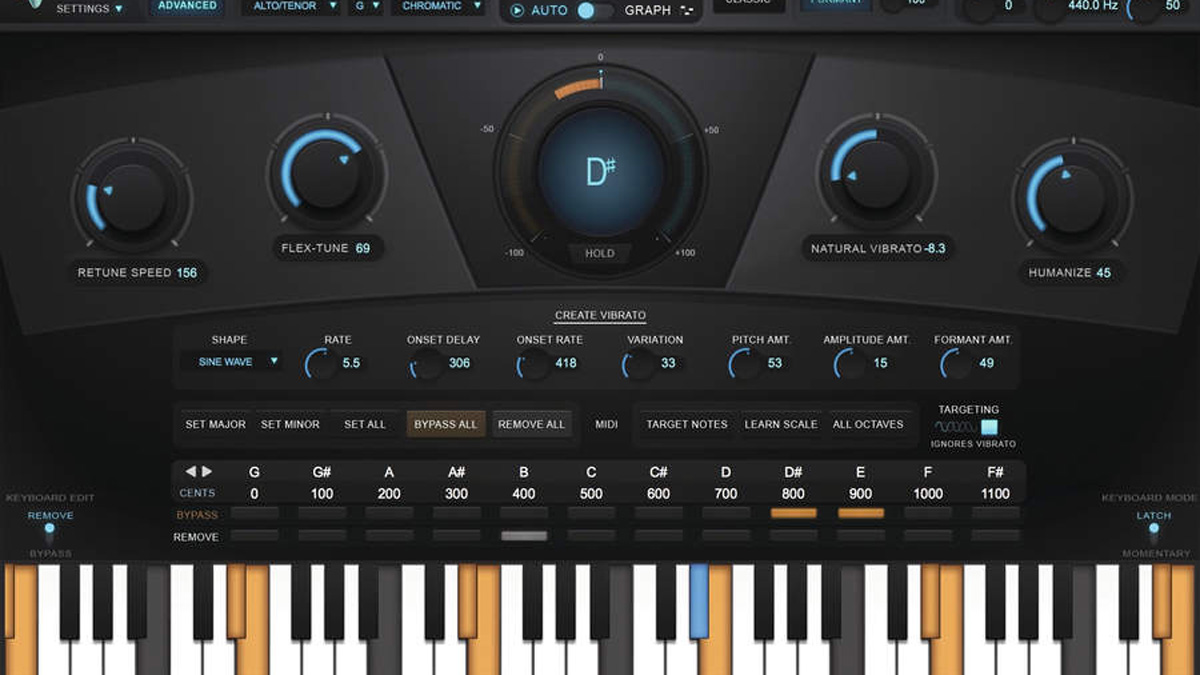
Specifications
Reasons to buy
Reasons to avoid
Antares kickstarted the automatic tuning revolution with Auto-Tune back in 1997. Like all Auto-Tunes, Pro takes an incoming signal and corrects any pitching, so puts an out-of-tune singer in tune. It can do this transparently, or with the famous ‘Cher/T-Pain’-style sudden jumps in pitch.
It’s operated in either of two modes: Auto and Graph, the first enabling real-time automatic re-pitching, the latter for detailed manual editing. You also get two views: Basic and Advanced. With Basic, choose a voice type, select the target key and scale, set specific pitches for removal (or leave unchanged). You can also use the Auto-Key plugin to detect the key and scale of the audio in your track, and transmit the results to all running instances of Auto-Tune.
Advanced view has a few extras like Create Vibrato, ideal for adding a bit of wobble via an LFO, plus options to set minor and major modes, edit across multiple octaves, and MIDI input editing features.
Auto-Tune Pro is the most powerful, usable incarnation of this standard yet, and easily maintains the software's position as one of the best retuning solutions available, and may well prove to be the ultimate pitch-manipulating toolbox.
Read the full Antares Auto-Tune Pro review
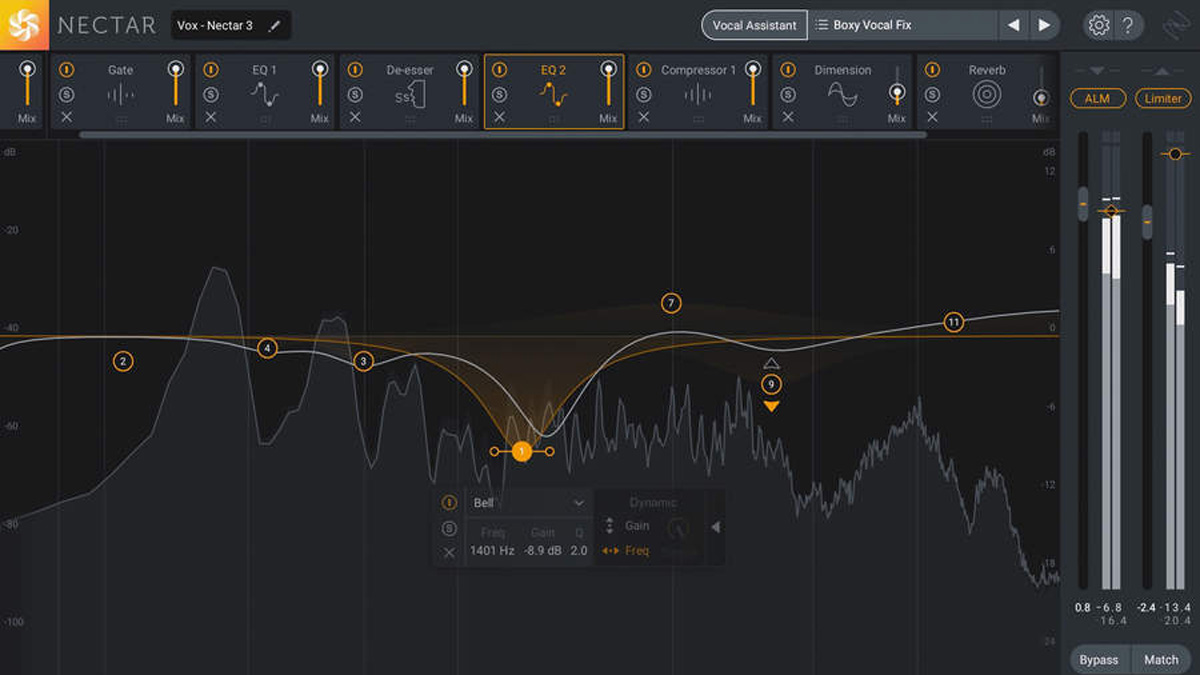
Specifications
Reasons to buy
Reasons to avoid
Nectar is a powerful one-stop vocal processing shop. It’s become a go-to plugin for the professional producer looking to easily get vocals of all kinds – from sung and rapped to dialogue and voiceover – sounding their best. It utilises an array of reorderable modules to apply voice-optimised dynamics shaping, EQ, pitch correction, harmonisation, de-essing, distortion and effects to your audio.
One of Nectar 3's many highlights is a machine learning-driven system for automatically setting up the plugin based on analysis of the input signal. Called Vocal Assistant, it creates a custom preset to make your vocal sound objectively ‘better’ and more mix-ready. Select Assist mode, point the algorithm in the right direction by choosing Vintage, Modern or Dialogue as the source ‘Vibes’, and Light, Moderate or Aggressive as the processing ‘Intensity’. The input signal is analysed for a few seconds, during which the modules are set up in the background to correct for dynamic fluctuations, resonant peaks, sibilance, and even adjust pitch correction and reverb mix.
In Unmask mode, Vocal Assistant clears space for the vocal by applying equalisation to any other track that’s fighting with it for space. The results are invariably well-judged and thoroughly effective, giving the vocals a perceived lift that’s almost always beneficial. This feature has also been enhanced for Nectar 3 Plus, the latest incarnation of Nectar.
With many other great features and modules plus a souped-up EQ, Nectar 3 sounds incredible and flows beautifully, and we can’t recommend it highly enough to any vocal-wrangling producer.
Read our full iZotope Nectar 3 Plus review
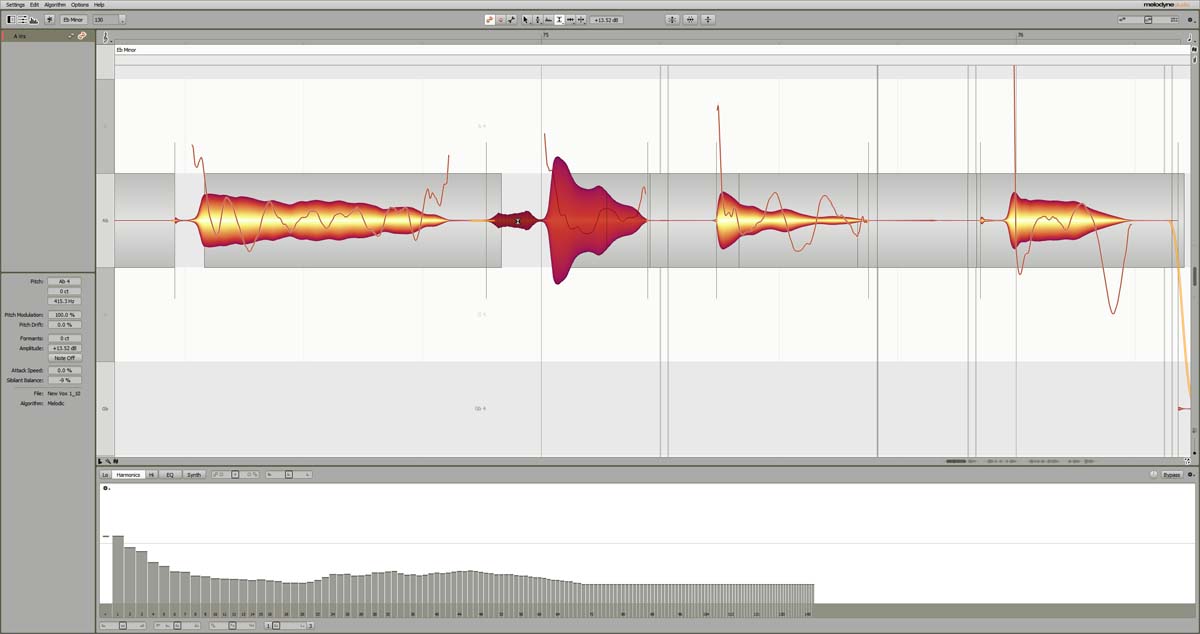
Specifications
Reasons to buy
Reasons to avoid
Where Antares has made the 'Cher sound' famous with Auto-Tune, Celemony's Melodyne brings more natural tuning to vocals – and indeed, anything else. You can even get in and edit polyphonic material, black magic technology that Celemony has been fine-tuning since 2009. And with the latest versions – there are several price bands you can buy into – integration with your DAW has never been better.
Recent additions include a Melodic algorithm that allows editing of noise-based sibilants to be carried out separately from pitch-based parts. Vocal pitch editing is also now incredibly natural due to features like a Levelling Macro that balances quiet and loud elements, and even the tiniest of pitch deviations can be tweaked.
Melodyne 5 Studio offers the full panoply of multitrack polyphonic editing options, but, if you mainly work with monophonic material, the more affordable Melodyne 5 Assistant – see prices above – still delivers many of the essential features. Whatever version, Melodyne is powerful and remains an exceptional tool for manipulating audio in functional and creative ways.
Read the full Celemony Melodyne 5 review
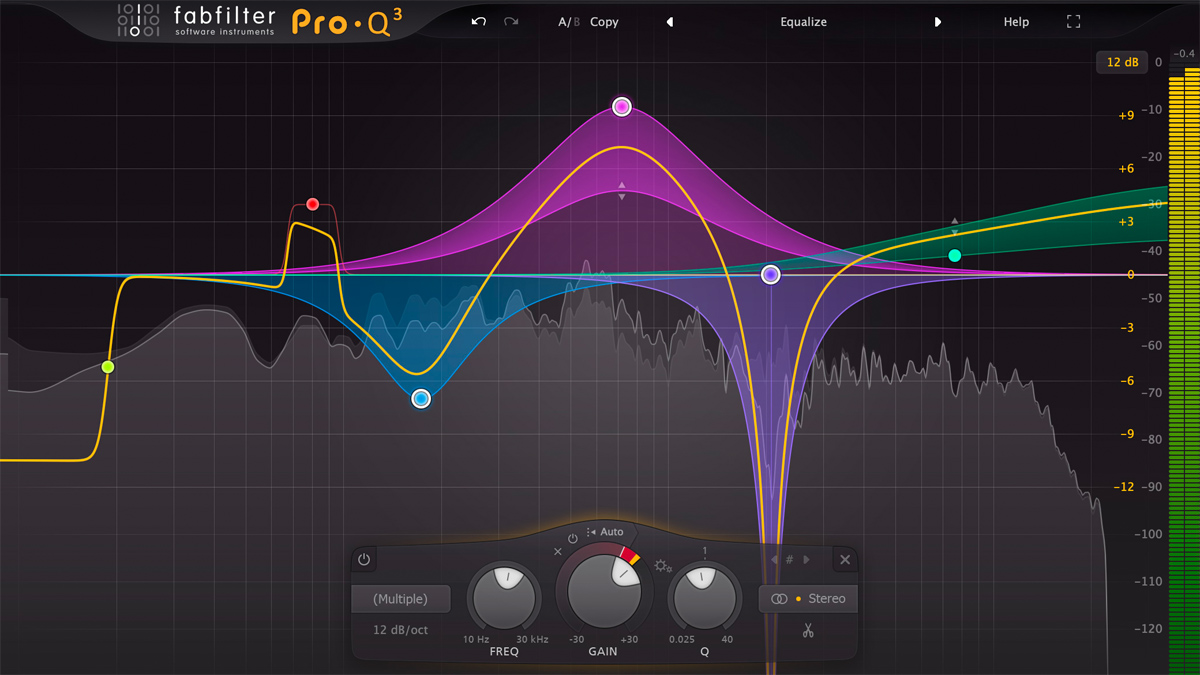
Specifications
Reasons to buy
Reasons to avoid
While not a dedicated vocal processor, Fabfilter's Pro-Q is one of the best EQs on the market, and every vocalist – or producer dealing with vocal recordings – needs a great EQ to tame all those frequencies around a vocal. There are many reasons why Pro-Q has become the number one choice, but the main attractions are its sound, features and beautiful display.
Double-clicking the spectral display creates a new EQ band, with its adjustable parameters appearing so you can easily tweak frequency, gain, EQ, plus the band's filter shape and slope. And of course there's a good variety of shapes to quickly adjust a signal's tonal balance.
But as good as its UI is, it's features like Spectrum Grab that have made the headlines, allowing you to control errant peaks and troughs with ease; or the Piano Roll display which was introduced in v2 to make it easy to target your cuts and boosts at specific pitches. EQ Match makes it easy to imbue the characteristics of one source signal on another – something since attempted by many other EQ designers. External Spectrum Visualization introduced in v3 allows you to see where frequencies conflict enough to cause problems – bass and kick drum for example. And finally Dynamic EQ mode allows you to create frequency nodes which respond dynamically to the input level of a signal, so that more attenuation is applied as the input signal gets louder.
While many other EQs will give you characterful results – and we heartily recommend Waves' Puigtec Bundle for warmth or Plugin Alliance's MAAG EQ4 for 'air' in this regard – Fabfilter's Pro-Q has carved its own path and it's a brilliant one. Not just for vocals, perhaps, but you won't find a better EQ to shape your singing.
Read our full FabFilter Pro-Q 3 review
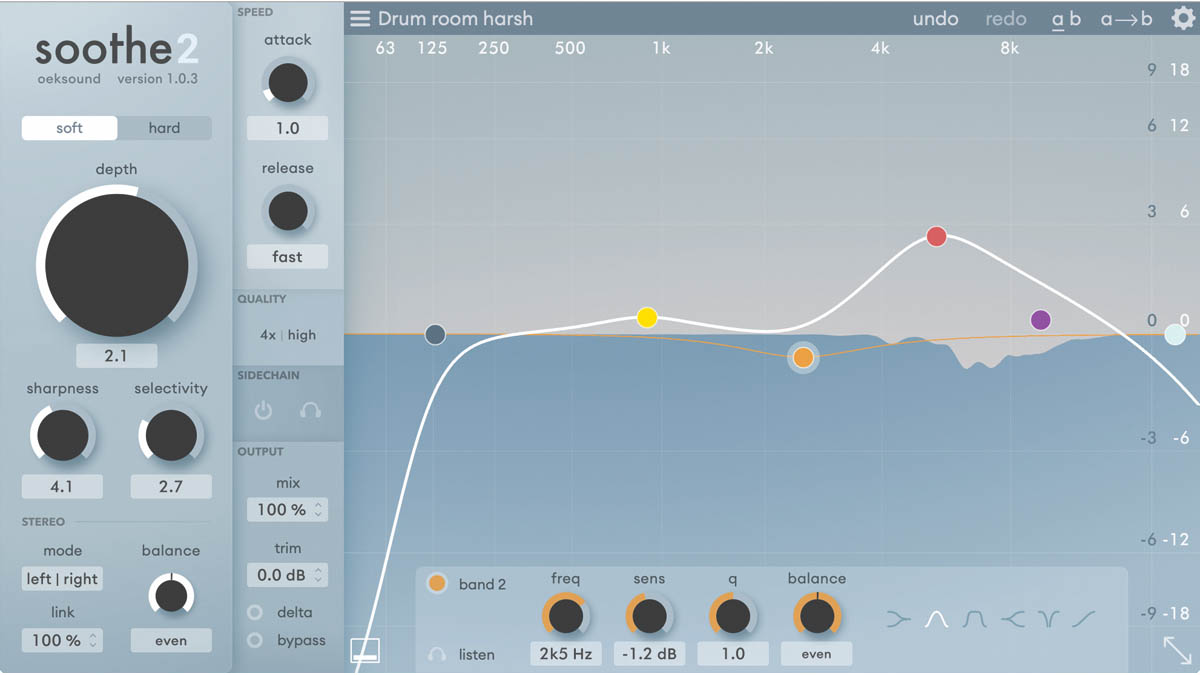
5. oeksound soothe2
Our expert review:
Specifications
Reasons to buy
Reasons to avoid
Soothe is an automatic dynamic frequency editor, and designed to remove harshness from instrumental and vocal recordings. It uses spectral processing to detect unpleasant resonances, and dynamically attenuates them via numerous level-sensitive notch filters. You might think this sounds like an EQ, but the band nodes control the reduction sensitivity dynamically within their specific frequency ranges. If you raise a node on screen, it will notch out the resonances within that band more profoundly as the volume increases.
Soothe makes this a beautifully realised process and the plugin has been a big hit with producers around the world. The latest version 2 reduces CPU load and latency and has much faster rendering, plus a wider frequency range that covers the lower end down to 20Hz. It also comes with many more EQ options than the debut version.
Add in extra envelope controls to manage the shape of the attenuation, a Balance option – to adjust the depth of processing between the left and right or mid and side channels – and soothe2 is a great, but not obvious, tool for a producer's vocal armoury. It will make any vocal (or instrument) recording that much less harsh, without losing the punch and impact.
Read the full oeksound soothe2 review
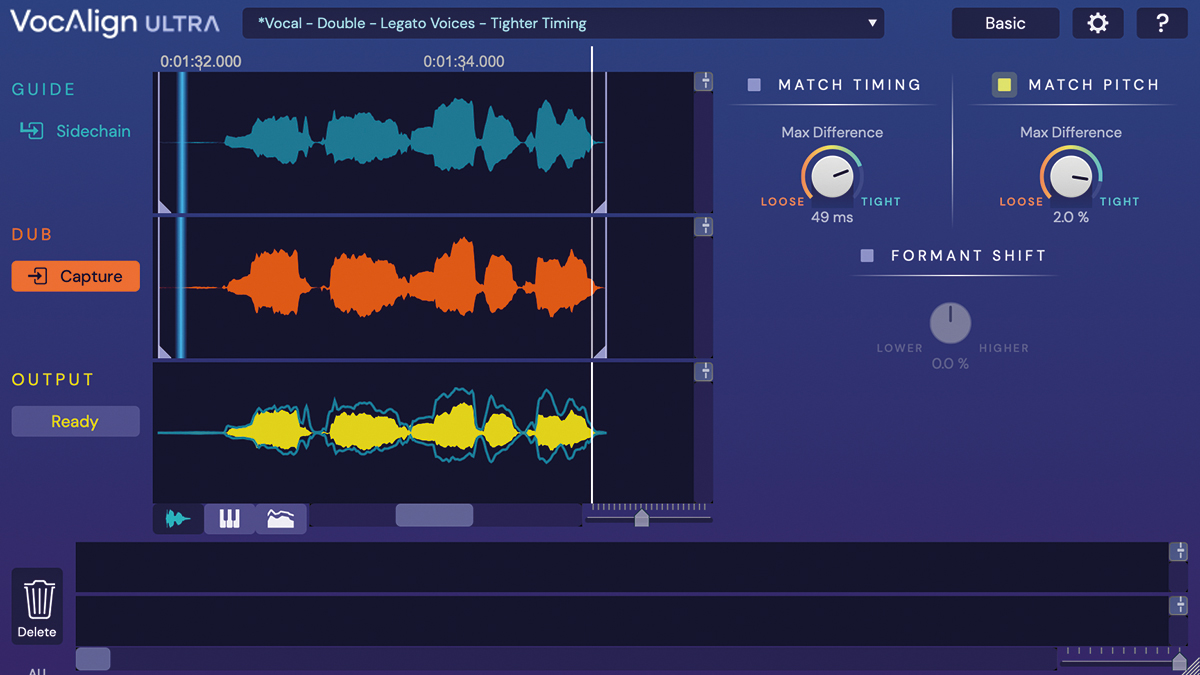
6. Synchro Arts VocAlign Ultra
Our expert review:
Specifications
Reasons to buy
Reasons to avoid
VocAlign is a long-established market-leading tool that adjusts the timing of an audio file (Dub) so it matches that of a source (Guide). It works well with any audio and is used for many music and post-production tasks. However it is particularly in demand for vocals and speech, where accurate pitch and timing alignment can be crucial. VocAlign Ultra sits between the affordable but basic VocAlign Project and Synchro Arts' flagship processor, Revoice Pro 4.
The software has three core processors – Match Timing, Match Pitch and Formant Shift – each accompanied by a parameter control to determine how loose or tight the matching processing is. It has great visual feedback with the three zoomable views – waveform, pitch and signal energy – allowing you to see timing and pitch both before and after processing. The display can be used to add manual Guide/Dub sync points or establish protected areas that won’t be processed – handy for more creative applications.
You can use VocAlign Ultra without delving too deeply into the advanced features. In that respect, we managed to tighten all manner of doubled and layered vocals. The results are very impressive and in many cases pleasantly transparent. It’s also very easy to adjust the amount of timing and pitch correction, and loosening things a bit is often the key to getting the most natural results.
VocAlign Ultra is impressive. It’s a bit pricey but if you do a lot of editing and aligning it will improve your productivity considerably.
Read the full Synchro Arts VocAlign Ultra review
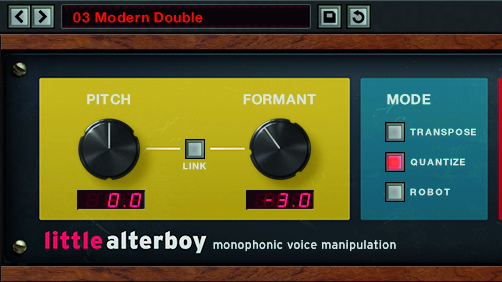
7. Soundtoys Little AlterBoy
Our expert review:
Specifications
Reasons to buy
Reasons to avoid
If there's one plugin that comes up more often than any other in our producer interviews as an all-time favourite, it's Soundtoys' Little AlterBoy. This simple but cheap plugin only boasts a few controls but can deliver wide-ranging results on any audio, but is specifically aimed at vocals for both pitch and format editing.
You get three main modes from left to right: the main controls for Pitch and Formant, three Mode options (Transpose, Quantize and Robot) and then a Drive and Mix area. The Pitch control alters the incoming audio by semitones but the beauty of AlterBoy is that you don't get the kind of high-pitch chipmunk effects you get with some pitch shifters – it's a far more natural shift (unless you want to make it more extreme).
The Formant option can, again very naturally, sweep a male vocal into a female, or vice versa. It's pretty incredible to hear it in operation because one of AlterBoy's main attractions is the fact that it does it with no nonsense, one dial with all the science bits hidden away. It just gets on with it, with brilliant results.
The central Modes are where things get even more interesting. After a simple Transpose option, you get Quantize, where notes are forced to the nearest semi-tone for that Auto-Tune like effect that has seemingly been a mainstay in so many genres for so many years. It works well and incredibly simply, although you'll probably get more finesse and tweakability out of the real-deal reviewed above. However, for no nonsense results, this is great. Finally here you also get Robot Mode, where the pitch is frozen to one note, no matter what the original input is singing. This pitch, and indeed the formant, can still be changed with the left hand dials.
Add in saturation via a Drive option and AlterBoy is a wonderful, diverse plugin that does the job and does it very well. Great for beginners and superb value.
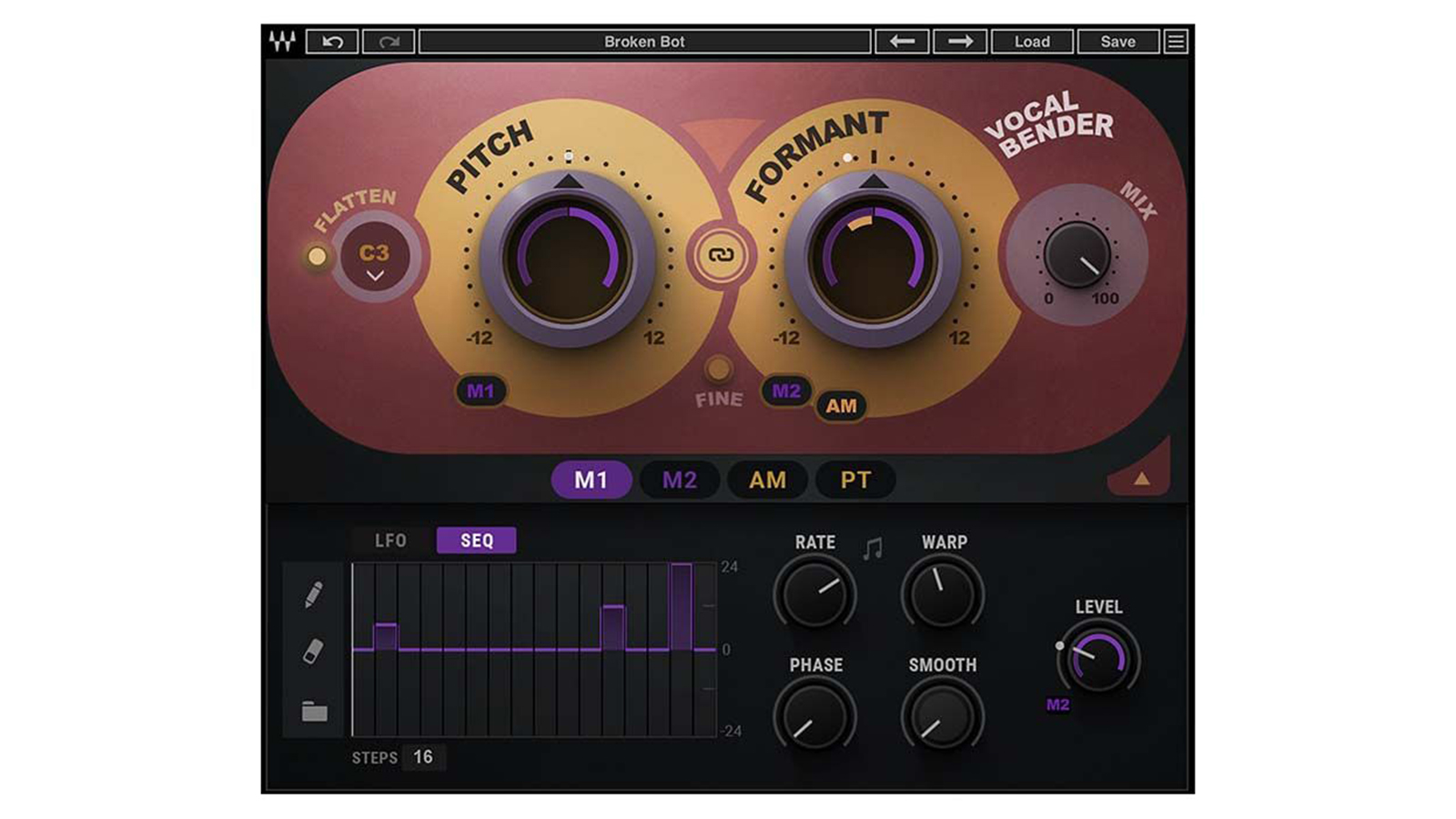
8. Waves Vocal Bender
Our expert review:
Specifications
Reasons to buy
Reasons to avoid
Waves has some great plugins for vocalists – particularly in its bundles like Silver, reviewed here, which includes the classic De-Esser and Doubler. However Vocal Bender is all about the pitch and formant editing, vocal processing that has remained enduringly popular across many genres.
There are two knobs, Pitch and Formant, controlling the central tone of the human vocal and the resonant frequencies that shape the timbre of the vocal. A Flatten button allows you to force the input to snap to a predetermined note, a speedy tool for building up augmented choruses and harmonies.
Experiment with the modulation and automation options, and vast creative scope presents itself. Automation can be a superb way of introducing vocal effects (such as sudden pitch drops) that activate based on the volume of the input signal, so the intensity of your performance can be the triggering factor.
The aim of the game with Vocal Bender is really getting that professional-sounding vocal manipulation at speed and with no processing lag. It is certainly one of the slickest vocal plugins we’ve experimented with – best in class for quick-fire, modern pitch manipulation.
Read the full Waves Vocal Bender review
Best vocal plugins: Buying advice
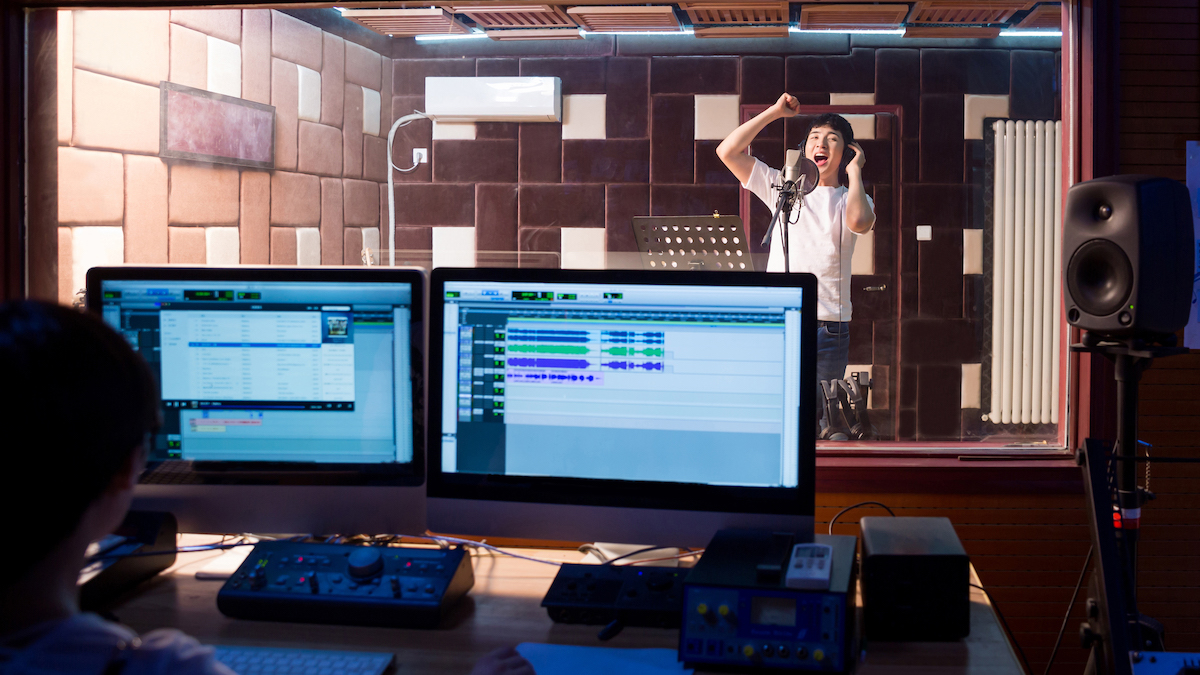
Identifying the best vocal plugin for your needs
MusicRadar's got your back
When it comes to buying a plugin specifically for vocals, you need to decide what your needs are from the many issues vocalists have. It might well be that a simple EQ is all you require, just to bolster certain frequencies to give your vocal more body, or remove mid and high frequencies to reduce overall harshness.
More likely you will have tuning issues. Even the best vocalists will have an off day in the studio and you might be left with the odd note to put in place, or you might simply need software to help 'guide' your vocalist as they sing. With all tuning issues, there are lots of options available, from software that gets right into a mix to edit tuning issues (Celemony Melodyne) to simple plugins like Little AlterBoy that nudge your pitch manually.
Do you need auto-tune?
The Auto-Tune effect is probably the biggest decider when it comes to vocal processing. This is the slightly synthetic and quantised vocal sound that has been a chart staple in many dance and rap genres since Cher made the effect famous in the song Believe in 1998. As well-trodden and arguably worn out this effect is, you can't deny its continued popularity, and those predicting its demise have been many and all mistaken over the last couple of decades. With that in mind, then, an 'Auto-Tune' like plugin is a good tool to have in your armoury and at least four of our options will deliver it, from the simple AlterBoy right up to the one that started it all, Auto-Tune Pro.
Find out more about how we test music gear and services at MusicRadar.
Related buyer's guides
- Best guitar VSTs to supercharge your recordings
- Best drum machine plugins
- Best synth plugins
- Best reverb plugins
- Best delay plugins
- Best creative multi-effects plugins
- Best compressor plugins
- Best EQ plugins
Want all the hottest music and gear news, reviews, deals, features and more, direct to your inbox? Sign up here.
Andy has been writing about music production and technology for 30 years having started out on Music Technology magazine back in 1992. He has edited the magazines Future Music, Keyboard Review, MusicTech and Computer Music, which he helped launch back in 1998. He owns way too many synthesizers.
